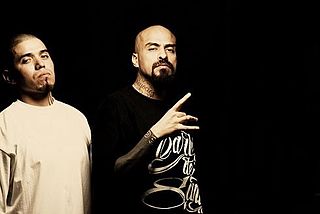Gangsta rap or gangster rap, initially called reality rap, is a subgenre of rap music that conveys the culture and values typical of urban gangs, reality of the world and street hustlers. Emerging in the late 1980s, gangsta rap's pioneers include Schoolly D of Philadelphia and Ice-T of Los Angeles, later expanding in California with artists such as N.W.A and Tupac Shakur. In 1992, via record producer and rapper Dr. Dre, rapper Snoop Dogg, and their G-funk sound, gangster rap broadened to mainstream popularity.
Latin hip hop is hip hop music that is recorded by artists in the United States of Hispanic and Latino descent, along with Spanish-speaking countries in the Caribbean, North America, Central America, South America, and Spain.
Turkish hip hop refers to hip hop music produced by members of the Turkish minority in Germany, and to a lesser degree by hip hop artists in Turkey. The Turkish minority, called the Turks, first drew inspiration from the discrimination and racism they received while living as migrant workers in Germany in the 1960s. Turkish hip hop uses Arabesk music, a folk style that finds its roots in Turkey during the 1960s, and is influenced by the hip hop music of America and Germany. Album artwork, lyrical content, and the Turkish language are used by hip hop artists to express their uniquely Turkish identity.
Urban contemporary music, also known as urban music, hip hop, urban pop, or just simply urban, is a music radio format. The term was coined by New York radio DJ Frankie Crocker in the early to mid-1970s as a synonym for Black music. Urban contemporary radio stations feature a playlist made up entirely of Black genres such as R&B, pop-rap, quiet storm, urban adult contemporary, hip hop, Latin music such as Latin pop, Chicano R&B and Chicano rap, and Caribbean music such as reggae and soca. Urban contemporary was developed through the characteristics of genres such as R&B and soul.

Chicano rap is a subgenre of hip hop that embodies aspects of the Mexican American or Chicano culture.

The Hip Hop Hoodíos are a multilingual rock en español/alternative rock and hip hop band. Founded in 2001 in Brooklyn, NY, the group is now bi-coastal and based in California and New York. They are composed of Josué Noriega, Abraham Vélez, and Federico Fong.
Cumbia rap is a spin-off of the original cumbia genre. It consists of a more traditional Colombian rhythm, as well as some hip hop and reggae type additions. Pioneers of cumbia rap include Crooked Stilo from Los Angeles in 2003, El Gran Silencio, Control Machete and Cartel de Santa from Nuevo Leon in the late 90's and early 2000's, Santa Fe Klan from Guanajuato, Chicos de Barrio from Coahuila, as well as the Kumbia Kings from Texas.

Akwid is a Chicano rap group. Brothers Francisco "AK" Gómez and Sergio "Wikid" Gómez, who make up Akwid, are originally from Jiquilpan, Michoacán, but grew up in Los Angeles, California. Before becoming Akwid both "AK" and "Wikid" were part of a former rap group named the "Head Knockerz" with other group members Sabu and John Doe

Hip hop or hip-hop is a culture and art movement that was created by African Americans, starting in the Bronx, New York City. Pioneered from Black American street culture, that had been around for years prior to its more mainstream discovery, it later reached other groups such as Latino Americans and Caribbean Americans. Hip-hop culture has historically been shaped and dominated by African American men, though female hip hop artists have contributed to the art form and culture as well. Hip hop culture is characterized by the key elements of rapping, DJing and turntablism, and breakdancing; other elements include graffiti, beatboxing, street entrepreneurship, hip hop language, and hip hop fashion. From hip hop culture emerged a new genre of popular music, hip hop music.
Serbian hip hop is an umbrella term for all genres of hip hop music in the Serbian language. It sometimes also refers to any hip hop music made by Serbs, including instrumental hip hop, and rap songs by members of the Serbian diaspora, often in languages other than Serbian. Some of most prominent hip hop groups include VIP, Sunshine, p.pop Beogradski Sindikat, Bad Copy. Popular solo artists include Juice, Gru, Struka, Ajs Nigrutin, Marčelo,

Cartel de Santa is a Mexican hip hop group from Santa Catarina, Nuevo León, Mexico, founded by Hector Montaño and Ronaldo Sifuentes. The band started playing in 1996 as part of the Avanzada Regia musical movement and Artilleria Pesada. Currently composed by Eduardo Davalos de Luna, also known as MC Babo or Babo, Rowan Rabia (beatmaker) and DJ Agustín. They have been referred to as one of the most notable Mexican hip-hop groups.
Twin Cities hip hop, also referred to as Minneapolis hip hop, is sub-genre of rap music that originates from the Minneapolis–Saint Paul metropolitan area in the U.S. state of Minnesota.
Latin alternative, or "alterlatino", or "Patchanka", is a brand of Latin rock music produced by combining genres like alternative rock, lofi, chillout, metal, electronica, hip hop, new wave, pop rock, punk rock, reggae, and ska with traditional Ibero-American sounds, in Latin Europeans and Latin Americans countries.

The annual MTV Video Music Awards Latinoamérica 2004 took place on October 21, 2004 in Miami at the Jackie Gleason Theater for the third time in a row.

Anamaría Tijoux Merino, commonly known by her stage name Ana Tijoux or Anita Tijoux, is a French-born Chilean musician. She became famous in Latin America as the MC of hip hop band Makiza during the late 1990s. In 2006, she crossed over to the mainstream of Latin pop after her collaboration with Mexican singer Julieta Venegas in the radio hit "Eres para mí". Tijoux has often been praised for "exploring sensitive matters devoid of violence." She gained more widespread recognition following her second solo album, 1977, and later with La bala (2011) and Vengo (2014) which brought her a Best Artist of the year award in the 2015 Pulsar Awards.
Hip-hop, or hip-hop music, also known as rap and formerly as disco rap, is a genre of popular music that originated in the early 1970s from African Americans and Afro-Caribbean immigrants in the Bronx, a borough of New York City. Hip-hop music originated as an anti-drug and anti-violence genre consisting of stylized rhythmic music that often accompanies rapping, a rhythmic delivery of poetic speech. In the early 1990s, a professor of African American studies at Temple University said, "Hip hop is something that blacks can unequivocally claim as their own." By the 21st century, the field of rappers had diversified by both race and gender. The music developed as part of the broader hip-hop culture, a subculture defined by four key stylistic elements: MCing/rapping, DJing/scratching with turntables, breakdancing, and graffiti art. While often used to refer solely to rapping and rap music, "hip hop" more properly denotes the practice of the entire subculture. The term hip hop music is sometimes used synonymously with the term rap music, though rapping is not a required component of hip hop music; the genre may also incorporate other elements of the culture, including DJing, turntablism, scratching, beatboxing, and instrumental tracks.
Avanzada Regia was a musical movement in the mid-1990s from Monterrey in Mexico.
Erick Raúl Alemán Ramírez , better known by his stage name Alemán, is a Mexican rapper.

Natanael Ruben Cano Monge is a Mexican rapper, musician and singer. Natanael is known for his fusion of trap music and regional Mexican corridos, known as corridos tumbados. The idea to fuse the two genres was proposed by Dan Sanchez who wrote Natanael's first corrido tumbado, "Soy el Diablo".

"Ch y la Pizza" is a song recorded and performed by the American group Fuerza Regida and the Mexican rapper Natanael Cano. It was written by Daniel Candia and Miguel Armenta and produced by Jesús Ortíz Paz, who is also the group's vocalist. It was released on December 1, 2022, as the lead single for the former's seventh studio album Pa Que Hablen (2022), through Rancho Humilde, Street Mob Records, Los CT and distributed by Sony Music Latin.









